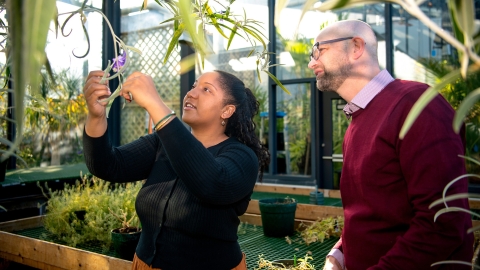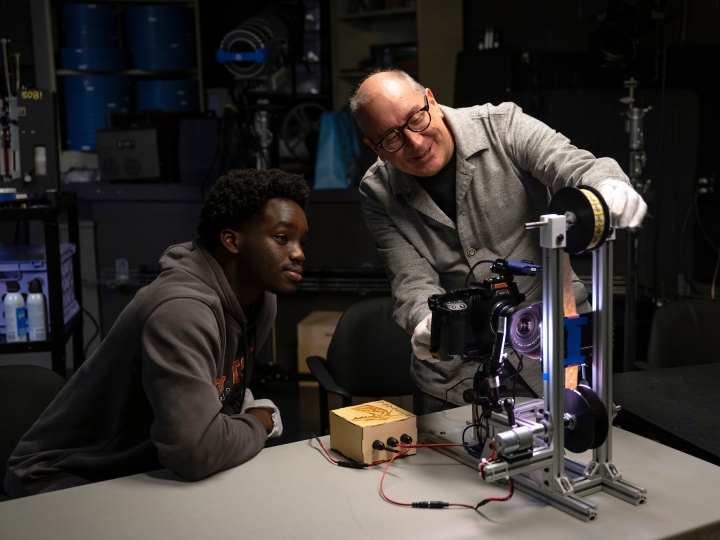
Bucknell Researchers 'Step Up' to Find New Plant Species
January 3, 2023
Tanisha Williams and Chris Martine examine an Australian bush tomato in the Rooke Science Building greenhouse. Photo by Emily Paine, Communications
Bucknell University biology postdoctoral fellow Tanisha Williams and Professor Chris Martine led a collaborative team of botany scientists from the U.S. and Australia who have found and named an undocumented Australian bush tomato species from the remote Outback.

Williams and Martine on the rim of the Wolfe Creek Meteorite Crater during fieldwork in Western Australia in June 2022. Photo by Angela McDonnell
The botanists were able to collect numerous new specimens of the plant, which was hiding in plain sight along a steep trail, from the Garrarnawun Lookout in Judbarra National Park. The task was made easier by the fact that the lookout is accessible by a set of dozens of human-made stone steps

Martine examines a Solanum scalarium plant at its only currently known location on the Escarpment Walk, Judbarra National Park, Northern Territory, Australia. Photo by Angela McDonnell
running directly from the unpaved parking area to the peak of the sandstone outcrop — without which the new species might have otherwise gone unnoticed.
Williams, Martine and co-authors, including Bucknell biology graduate Jonathan Hayes '21 of Mifflinburg, Pa., have now published the new species description in the open-access journal PhytoKeys, choosing the name Solanum scalarium as a nod to the steps leading to the plant and the unusual ladder-like prickles that adorn the flowering stems. The Latin "scalarium" translates to "ladder," "staircase" or "stairs."
"This Latin name does relate to the appearance of this species, how it looks," says Williams, the paper's lead author. "But it is also a way for us to acknowledge how important it is to create ways for people to have greater access to natural spaces — not just scientists like us, but everyone."
According to the authors, a recent study done by the Department of Local Government, Sport and Cultural Industries in Western Australia found that eight in 10 people said it is important to have access to natural spaces, both locally and outside of their current jurisdictions. However, one in three persons felt dissatisfied with the current outdoor spaces available to them and many identified barriers to access and participation in outdoor activities that include urbanization — which is especially credited for the growing number of Australians who lack outdoor experiences.
"These disparities of who is and who isn't participating and who feels safe and welcomed are artifacts of historic and current environmental and social injustices," says Williams. "The disparities in who has access to these natural spaces is not just a concern in Australia, it's a problem around the world, including right here in the U.S."

Solanum scalarium showing the unusual ladder-like arrangement of prickles on male floral stems. Photo by Jonathan Hayes '21
Also now identified as the Garrarnawun Bush Tomato by the authors, Solanum scalarium is a distant cousin of the cultivated eggplant and a close relative to a number of other Australian species recently documented by Martine and colleagues, including Solanum plastisexum, named to reflect the diversity of sex forms across Earth's organisms, and Solanum watneyi, named for the space botanist of the book/film The Martian.
The scientists hope that the naming of this latest new species highlights the importance of building community around natural spaces.
"We suggest the use of Garrarnawun bush tomato for the English-language common name of the species," Martine says. "It's in recognition of the Garrarnawun Lookout near where the type collection was made, a traditional meeting place of the Wardaman and Nungali Ngaliwurru peoples whose lands overlap in this area."
Hayes measured and analyzed the physical characteristics of the new species using plants grown from seeds in a campus greenhouse. He joins Williams, Martine, Angela McDonnell (St. Cloud State University) and Jason Cantley (San Francisco State University) — Martine's previous postdoctoral fellows at Bucknell — and Peter Jobson (Northern Territory Herbarium in Alice Springs, Australia) as authors of the new species description.

